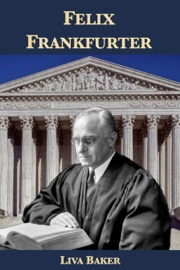 $9.99 on Kindle
$9.99 on Kindle(cover by Susan Erony)
Felix Frankfurter by Liva Baker (132,000 words and 19 illustrations)
“The author has written a very interesting book... She did much research in primary sources, and held many interviews with those best acquainted with her illustrious hero.
Born in Austria of a Jewish family, Felix Frankfurter read avidly from his youth. As a lad, he determined to be a lawyer and worked assiduously toward his objective. His ambition and his precocious mind kept him at the head of his classes in America, where he grew up. Soon after completing his legal training, he began to mix private professional services with public office holding. Although he frequently aided friends to win elective offices, Frankfurter never sought an elective office himself. From a United States District Attorney to an Associate Justice of the United States Supreme Court, his public offices were all appointments.
Frankfurter, as a young man, was attracted by Woodrow Wilson and his New Freedom. In Washington as a government employee, this Jewish lawyer contended, with great confidence, that the state, as well as the national government, had the duty and right to erect social legislation.
In 1914, as a teacher at Harvard, Frankfurter contended that law was not a mere abstraction but that society, by breathing into law the ‘breath of life,’ made it a living soul. Disliking formal lecturing, the law professor much preferred to have his pupils in small groups in animated discussions. Although an academician, this teacher was most active publicly in arguing cases, in writing, and in counseling.
In World War I, Frankfurter became an attorney in the War Department. Secretary Baker put him in charge of labor problems. He became a recognized leader in President Wilson’s Mediation Commission. Sent by the President to assist Secretary of Labor Wilson, Frankfurter headed the War Labor Policies Board. A delegate to the Paris Peace Conference, he aided in drawing up the Balfour Declaration for the return of Palestine to the Jews. The Peace Conference ended, however, without the Middle Eastern problems being solved.
Once again Frankfurter returned to Harvard to train young lawyers to combine an academic with an active public life. For twenty years, the professor continued to teach. In 1939, at the age of 56, President Roosevelt, a long time friend, appointed him an Associate Justice of the United States Supreme Court. Here Frankfurter served for twenty-three years until invalidism overtook him some months before his death in 1965. The appointment of his friend and political advisor to the bench was not the first time Roosevelt tried to bring the professor into the New Deal Administration. Several other efforts failed because Frankfurter, obviously, wanted only a Supreme Court position.
During his years on the Supreme Court, Justice Frankfurter wrote 725 opinions of which 291 were dissents. According to the author, the Justice brought informality and impish humor to the nation’s most august tribunal. Some of Frankfurter’s colleagues said that he lectured them as he had his Harvard students. The former teacher declared that oddly most of the great safeguards of human liberty were forged by cases involving not very nice people.
Justice Frankfurter believed the United States Supreme Court should practice self-imposed restraint. He opposed judicial law-making in all courts. Likewise, he contended that the courts should never enter the political arena. The author discusses well the Brown v. Board of Education and other desegregation cases, as well as the Baker v. Carr and other reapportionment cases, and shows how Justice Frankfurter came to decide with the majority in these law-making and politically activated cases.
While this is not the definitive biography of Justice Frankfurter, it is an excellent and timely one.” — George Osborn, Professor of Social Sciences, University of Florida-Gainesville, The Annals of the American Academy of Political and Social Science
“A worthwhile and complete compendium of the vital statistics of a great man in relation to the public life of the period... Two criticisms of Frankfurter often voiced during the latter part of his life were that in the great travail of the Jewish people he made no effort to help them, notwithstanding his profound influence on the President, and, that in spite of his great reputation as a ‘liberal’ before he was appointed to the Supreme Court, he turned ‘conservative’ afterwards. The author treats both these subjects with balanced judgment.” — Mendes Hershman, Jewish Social Studies



